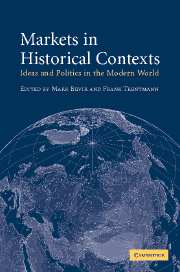Book contents
- Frontmatter
- Contents
- Acknowledgements
- List of contributors
- 1 Markets in historical contexts: ideas, practices and governance
- 2 Improving justice: communities of norms in the Great Transformation
- 3 The politics of political economy in France from Rousseau to Constant
- 4 Tories and markets: Britain 1800–1850
- 5 Guild theory and guild organization in France and Germany during the nineteenth century
- 6 Thinking green, nineteenth-century style: John Stuart Mill and John Ruskin
- 7 Tönnies on ‘community’ and ‘civil society’: clarifying some cross-currents in post-Marxian political thought
- 8 German historicism, progressive social thought, and the interventionist state in the United States since the 1880s
- 9 Civilizing markets: traditions of consumer politics in twentieth-century Britain, Japan and the United States
- 10 The ideologically embedded market: political legitimation and economic reform in India
- 11 The locational and institutional embeddedness of electronic markets: the case of the global capital markets
- Index
8 - German historicism, progressive social thought, and the interventionist state in the United States since the 1880s
Published online by Cambridge University Press: 22 July 2009
- Frontmatter
- Contents
- Acknowledgements
- List of contributors
- 1 Markets in historical contexts: ideas, practices and governance
- 2 Improving justice: communities of norms in the Great Transformation
- 3 The politics of political economy in France from Rousseau to Constant
- 4 Tories and markets: Britain 1800–1850
- 5 Guild theory and guild organization in France and Germany during the nineteenth century
- 6 Thinking green, nineteenth-century style: John Stuart Mill and John Ruskin
- 7 Tönnies on ‘community’ and ‘civil society’: clarifying some cross-currents in post-Marxian political thought
- 8 German historicism, progressive social thought, and the interventionist state in the United States since the 1880s
- 9 Civilizing markets: traditions of consumer politics in twentieth-century Britain, Japan and the United States
- 10 The ideologically embedded market: political legitimation and economic reform in India
- 11 The locational and institutional embeddedness of electronic markets: the case of the global capital markets
- Index
Summary
In the spring of 1887, during the heyday of the Gilded Age, the Contemporary Review printed an article by the chief editorial writer of a Midwestern newspaper which voiced the heretical opinion that ‘the laissez-faire doctrine of government is as foreign to the true genius of social and political life in the Western States as is the ultra-socialistic doctrine’. The author listed public land policies, railroad land grants, inspection laws, agricultural loans, public health legislation, schooling, and licensing laws as examples of widely accepted domains of government intervention. ‘Legislation intended to enforce certain standards of morality’, he added, ‘is perhaps more prolific and vigorous in the United States … than anywhere else in the world.’
What appeared to be the outburst of a minor prairie radical was in fact the considered view of Albert Shaw, a genteel reformer who became a leading light in progressive journalism, was a friend of Woodrow Wilson's, and later advised Theodore Roosevelt. More importantly, Shaw's article reflected not only homegrown scepticism about free market capitalism, but also the growing significance of European social thought in American reform. Shaw was a prominent member of the newly established American Economic Association (AEA), which at the time was not only a professional organization of dissenting economists, but also a clearinghouse for European ideas critical of laissez faire. The AEA included social scientists, politicians, reformers and journalists, and provided a microcosm of the growing transnational network of reformers and academics in US reform politics.
- Type
- Chapter
- Information
- Markets in Historical ContextsIdeas and Politics in the Modern World, pp. 145 - 169Publisher: Cambridge University PressPrint publication year: 2004
- 1
- Cited by



